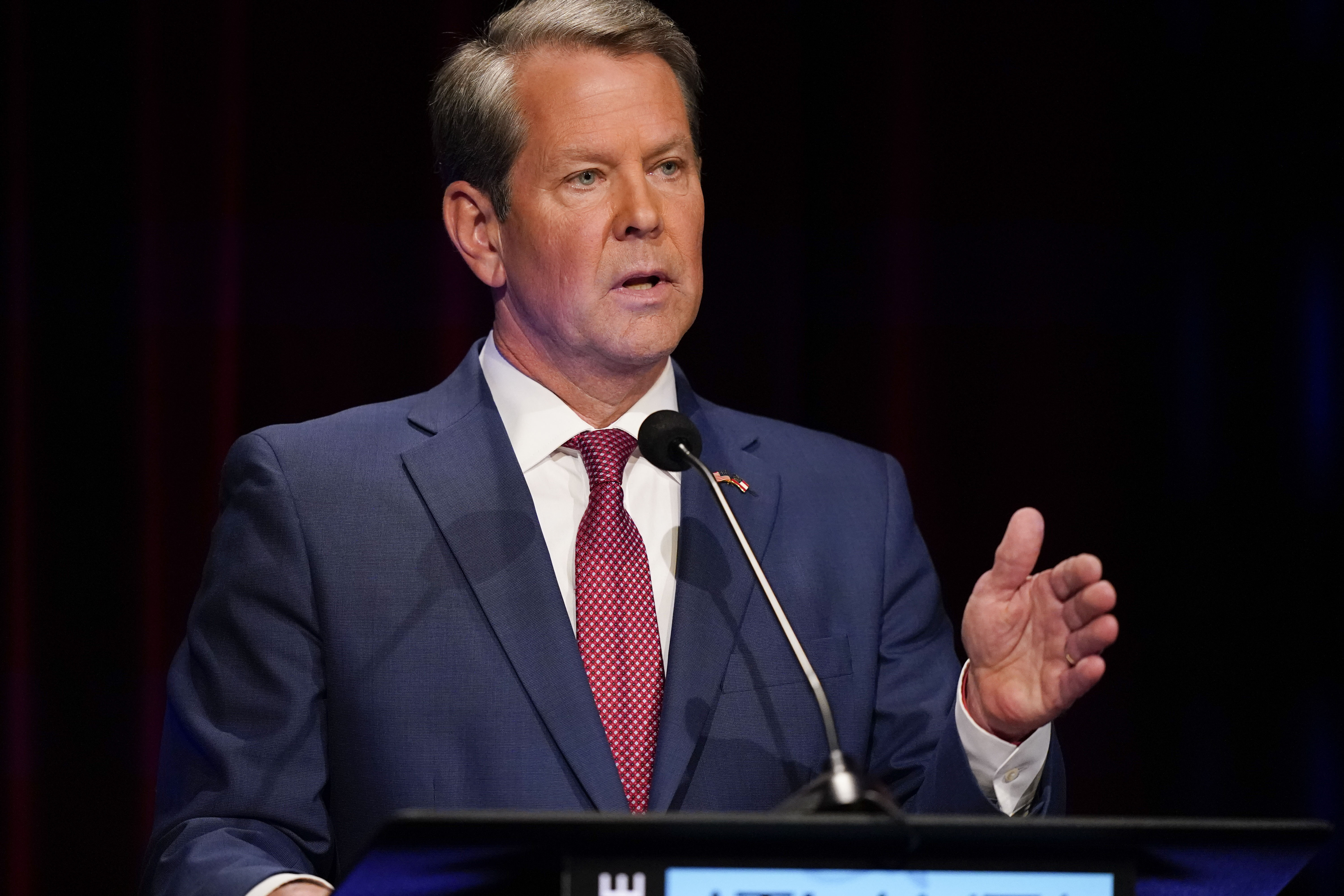‘No one’s paying any attention’: The week that Republicans ignored Trump’s election lies
Donald Trump has been lying about voter fraud for so long that his impugning of yet another election seemed almost inevitable.
What was more revealing was that, for the first time, Republicans appeared not to be listening.
Mehmet Oz, the Trump-backed Senate candidate in Pennsylvania, did not prematurely declare victory last week, as Trump said he should. David McCormick, who is running narrowly behind Oz, has not claimed the election is unfair.
“No one’s paying any attention to it,” said Christopher Nicholas, a longtime Republican consultant based in Harrisburg.
Ever since the 2020 election, the Republican Party has been transfixed by Trump’s baseless claim that the 2020 election was “rigged,” a falsehood large majorities of Republicans still believe. It’s an obsession that has animated primary campaigns across the country. And it will almost certainly resurface in the general election, when Republicans are running against Democrats, not one another.
Yet in Pennsylvania, Trump’s earliest effort to graft his 2020 complaints onto ballot counting in a midterm primary is falling flat. MAGA hard-liners who’ve lost primaries in other states in recent weeks have not contested the results. And when the primary calendar turns to Georgia on Tuesday, Trump’s election conspiracy crusade is likely to take another hit.
In that state, Gov. Brian Kemp is widely expected to finish first in his gubernatorial primary, despite being savaged by Trump for his resistance to Trump’s efforts to overturn the results of the 2020 election.
It’s an indication, early in the midterm primary calendar, that even in a party beholden to Trump, there is a limit to his reach.
“I think the shine has gone off a bit,” said Jason Shepherd, a former chair of the Republican Party in Georgia’s Cobb County, in the Atlanta suburbs.
Republicans, he said, “are realizing it’s great to have Trump’s endorsement,” but that the former president “is not going to be the end-all and be-all.”
In Pennsylvania, where votes are still being counted, the Oz and McCormick campaigns are preparing for a potentially fierce recount, including bringing on alumni of Trump’s 2020 campaign. It’s possible, once the result comes in, that the party will once again abandon pre-Trump norms.

But one Republican who has advised Trump and is familiar with both the Oz and McCormick operations said “nobody wants to be viewed as a sore loser and make allegations they can’t sustain.”
“They’re both intelligent guys,” the person said. “They’re both sane guys, and neither of them wants to embarrass himself.”
Two years ago, Republicans did not have such reservations — with losing candidates up and down the ballot copying Trump’s fraud claims or refusing to concede. They may do so again in the fall.
But Trump never limited his complaints about rigged elections to match-ups with Democrats. He accused Sen. Ted Cruz of stealing the Iowa caucuses in 2016, calling for a do-over.
Yet losing candidates so far in this midterm have been reluctant to go there. In Nebraska, Charles Herbster, a Trump megadonor and friend of the former president who attended the Jan. 6 rally in Washington that preceded the riot at the Capitol, conceded after losing his gubernatorial run. So did Idaho Lt. Gov. Janice McGeachin, after her failed, Trump-backed bid to unseat Gov. Brad Little.
Even Rep. Madison Cawthorn conceded, the North Carolina Republican’s diatribe about “Dark MAGA” notwithstanding.
None of that is because Trump — or voter fraud — does not still resonate in the GOP. Trump helped pull his favored candidates to victory in key Senate races in Ohio and North Carolina. And in Pennsylvania last week, Doug Mastriano, the far-right election denier Trump endorsed, won the gubernatorial primary.
Even candidates Trump has not endorsed are wrapping themselves in any connection they can draw to him, and his rhetoric is still being parroted by prominent personalities on the right.
Last week, Cruz told The Washington Post that mail ballots in Pennsylvania create “serious opportunity for mischief.” And Fox News host Sean Hannity, an Oz ally, also parroted Trump, saying he does not “trust … the people that have the ballots.”
But for Republican candidates this cycle, the difference between 2022 and 2020, said John Thomas, a Republican strategist working on House campaigns across the country, is that “we’re just not seeing it where people hang on his every word.”
He advises his candidates to watch Tucker Carlson every night to “be in tune” with the electorate, not Trump on Truth Social, the platform on which Trump suggested the Pennsylvania election might be “rigged.”
“You want the glow and the halo effect of Donald Trump, but he’s not shaping policy at the moment,” Thomas said. “It matters who can get that nod and that halo effect from Trump, but outside of that, he kind of feels like an ex-president to me.”
Trump will likely have a mixed night Tuesday in the next big round of primaries. His preferred Senate candidate in Georgia, Herschel Walker, is favored to win. And Secretary of State Brad Raffensperger is at risk of losing reelection after refusing to “find” votes for Trump in 2020.
But even in Georgia, which became an epicenter of Trump’s false election claims after he lost the state to Joe Biden in 2020, the tide may be shifting away from him. A recent Atlanta Journal-Constitution poll found Republican voters are more confident now in the integrity of their state’s elections than they were just several months ago.
And in a Fox News poll last week, just a quarter of Republican primary voters said it’s extremely important that a candidate identifies as a strong Trump supporter in order to earn their vote for governor. By contrast, nearly two-thirds said someone who “can win in November” is paramount, and 35 percent said it’s critical that a candidate “supports a Georgia abortion ban.”
In that race, Kemp is running so far ahead of Trump’s endorsed candidate, former Sen. David Perdue, who has made false claims about the 2020 election a centerpiece of his campaign, that he may avoid a runoff.

“We get it that people are still trying to exude a level of Trumpism as an attractive policy agenda,” said John Watson, a former chair of the Georgia Republican Party. “But my personal sense is that voters are saying, ‘Dude, chill.’”
He said, “I think there’s always going to be a constituency in the party, at least for the foreseeable future, that thinks that every damn election is rigged. But I think fundamentally, your average, serial primary voter is just smarter than that. I think they just believe it to be a Trump shtick at this point.”
A Trump spokesperson did not respond to a request for comment. But for the former president, the imperative of keeping the routine up is obvious. He is deeply invested in his win-loss record in the midterms, and casting doubt on the Pennsylvania election will offer him a crutch in case Oz loses.
Among traditionalist Republicans, Trump’s intervention in Pennsylvania was widely viewed as a distraction from a favorable midterm election climate for the GOP, with concerns about the state of the economy and a deeply unpopular Democratic president to run against.
“There are pressing issues that need to be addressed, like inflation and the war in Ukraine, and we have a lot of overreach in the regulatory environment,” said Melissa Hart, a former congresswoman from Pennsylvania who dropped out of the state’s gubernatorial primary days before the election. “As far as I’m concerned, it’s time to move forward.”
Go To Source
Author: POLITICO

